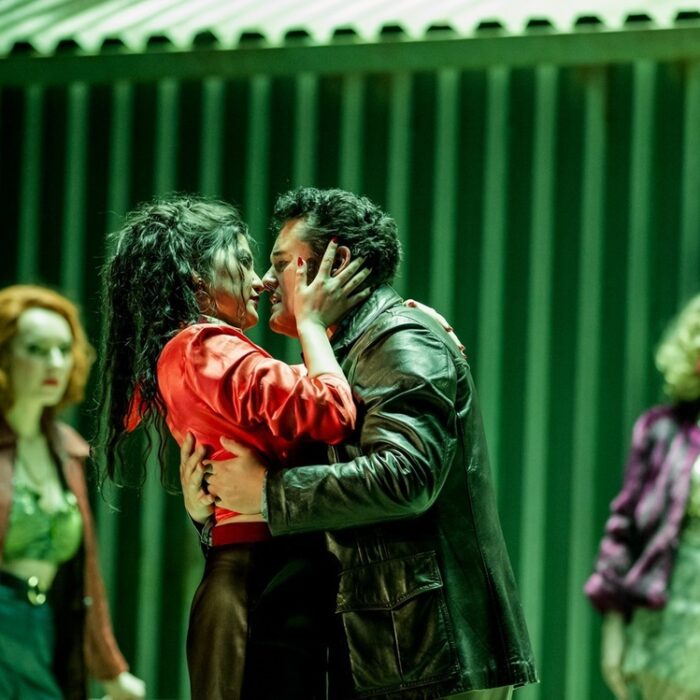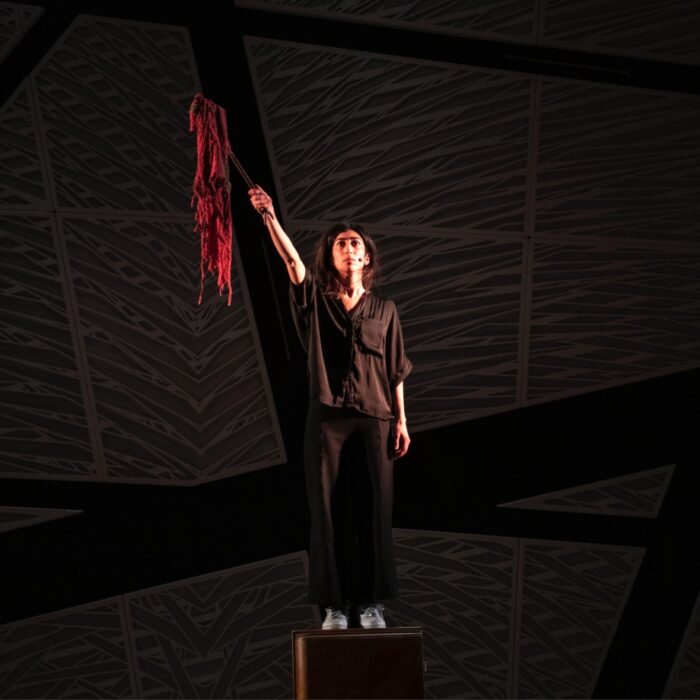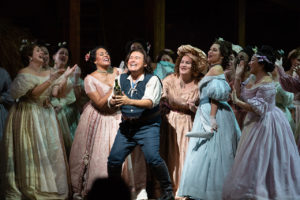
Metropolitan Opera 2022-23 Review: L’Elisir d’Amore
Javier Camarena Shines in Dreary Barlett Sher Production
By Francisco Salazar(Credit: Marty Sohl / Met Opera)
Last month the Metropolitan Opera opened its final run of Sonja Frisell’s legendary “Aida” staging. The production, which opened in 1988, remains somewhat of a splendor for its lush and detailed sets. As I noted in my recent review, I have never been the biggest fan of this particular mise-en-scène, but on this revival, I realized how impressive the sets truly were.
Fast-forward a month and the Met opened a revival of its 2012 production of “L’Eisir d’Amore” on Jan. 10. The production by Bartlett Sher opened 10 years ago to mixed reviews due to its confusing lack ideas or comical insight. Now in 2023, the production looks dusty and tired. Unlike the Met’s “Aida,” “L’Elisir’s” painted tableaus lack detail and when compared to some of the older productions, like “Aida,” looks out of place on the Met’s hallowed stage.
When you think of Donizetti’s masterful comedy, you think of bright colors to match the sunny, lush, quirky, and joyous music. And for a work that is so beloved, it deserves a production with similarly inspired direction. Sher’s production was never there when it opened and it hasn’t particularly aged well in the interim.
Questionable Direction
Revivals are interesting propositions. On one hand, you want to remain true to the original intentions behind it but they also provide ample opportunity for reworking and even improving on a production and even giving artists a chance to put their own stamp on the proceedings. One would argue that most of the Met productions, which are generally not concept-based or dependent, scream for this kind of approach. And often, when the right performers arrive, this is exactly what we get. One recent example would be Aleksandra Kurzak’s interpretation of “Tosca” where her interpretation and presence lit up McVicar’s quaint staging. In this revival of “Elisir,” it was clear that the performers were looking to do much the same, especially in Act one, but they couldn’t overcome some of the original blocking and choices. When the production first opened Sher said, “It’s a great entertainment and an opera with something else happening underneath it. And that’s the Risorgimento, the development of Italian independence.”
And with the idea of the Risorgimento, Sher decided to take some of the comedy away from the circumstances and darken the proceedings, which unfortunately doesn’t jive with anything in Donizetti’s work. As the village people prepare for Adina and Belcore’s wedding, Donizetti writes joyous music while we see Nemorino desperately calling out for Dulcamara. It’s music that has two actions going on but at the same time, there is much levity in its conception. However, Sher decides to show Nemorino getting beaten up by soldiers; but he doesn’t stop there. He also showcases soldiers being abusive toward women and forcing them to dance.
Then there is Dulcarmara as an arms dealer as he sings his famous “Udite.” The idea is put on hold until the second act, when we see Dulcamara randomly take out a gun during the barcarolle. Where does the idea go? What does this all say about the Risorgimento or Italy’s independence? Absolutely nothing. What does it say about “L’Elisir?” Absolutely nothing. Unfortunately, 10 years later, this concept continues to come across as something that never fully developed beyond the brainstorming phase. What’s worse, given the conversation around armed weapons in this country and the war in Ukraine, leaving this particular staging as some flourish in a comic production is also questionable.
Over the past month, the Met announced it would be putting more emphasis on modern works because the classics were not performing well at the box office. This uninspired staging of “Elixir” certainly backs up that argument.
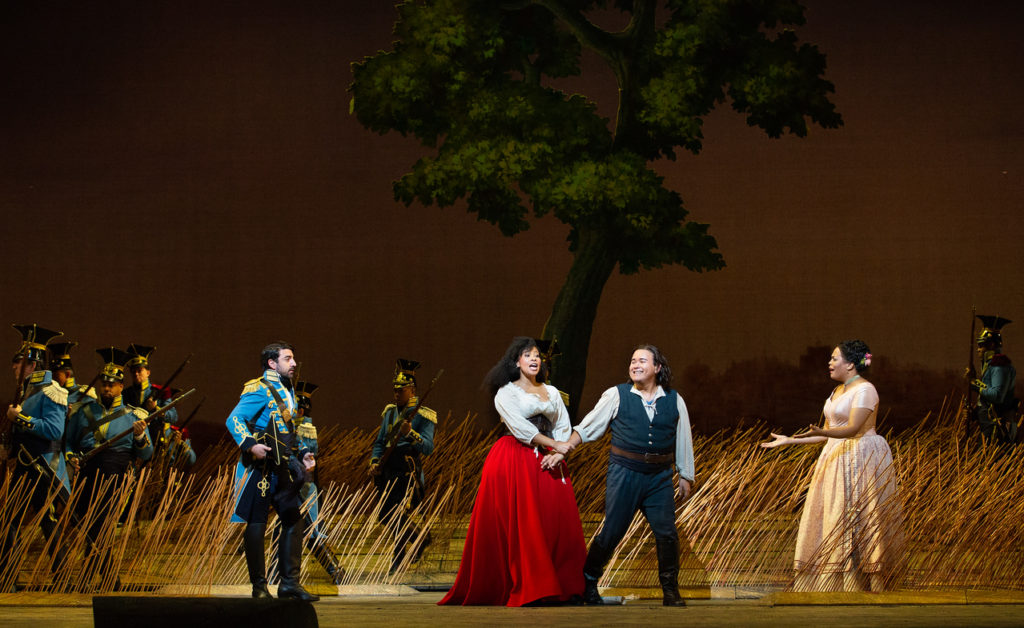
Marty Sohl/Met Opera
The Star
In the role of Nemorino was tenor Javier Camarena. The Mexican tenor’s voice has evolved, shifting away from the light and high-flying tenor of years past when Rossini was at the core of his repertory, into something weightier and rounder. This was most evident when he sang a High C on his run “Dulcamara” in the duet with Belcore. The note was secure and impressive, but it lacked the brightness and flexibility from past years.
Meanwhile, his opening “Quanto e bella quanto e cara” was sung with a sincere tone that showed the tenor’s elegant phrasing and bel canto style. However, his upper register seemed to be less agile during the aria with a slight rasp heard in the upper range. That unsteadiness could also be heard in the famed “Una Furtiva Lagrima.” In that second aria, he began with an uncharacteristic straight tone that eventually developed into vibrato, leading to some wonky intonation. As the aria developed his voice took on an earthy quality and his dynamics went from a hushed timbre to a gleaming high note. In the second verse, “Un solo istante i palpiti,” he took a different approach singing with a piano sound that crescendoed steadily. The cadenza that ends the aria was a bit messy but that didn’t stop him from getting the ovation at the end.
During his duet with Adina, “Una parola Adina,” Camarena showed an emotional intensity that was comforting and lovable. In his “Lallarallara la la” passage after drinking the “Elisir,” the tenor delivered the lines with brightness and flexible phrases. He ran around the stage with a huge smile and even jumped on boxes. He also took one of the chorus girls and danced with her. Then in the “Esulti pur la barbara,” he sang with confidence and playfulness as he kept his eyes fixed on his Adina, Golda Schultz. The two ended the duet with a tender embrace before moving away from one another. In the second part of the duet, Camarena flirted and even made fun of Schultz, almost dancing with his bottle. In the big concertato, “Adina credimi te ne scongiure,” Camarena unleashed his full sound passionately, even interpolating a high note in the middle of the nostalgic music.
In the second act, Camarena embraced the comic nature of his duet with Dulcamara, singing with strong and smooth phrases, and even imbuing Nemorino with pompousness as he confronted Davide Luciano’s bombastic Belcore. There was even a moment when he let out a Mariachi cry, a good touch. In his subsequent scene with Gianetta, Camarena flirted with the women’s chorus while running around with them as a drunk. This scene elicited some of the biggest laughs of the night and Camarena relished the lines “Dell elisir mirabile” and “Ah! ah! è bellissima!” emoting some of the lines. “Io già m’immagino che cosa brami” demonstrated his flexible coloratura and Camarena smiled while he sang the runs.
Overall this was a welcome interpretation from the tenor.
New to Bel Canto
As Adina, Golda Schultz was making her role debut, incidentally her first Bel Canto part. Schultz was an active presence on stage imbuing Adina with spunk and energy. She enlightened the stage with charisma as she sword-fought with Davide Luciano’s Belcore or read her book to the villagers in her first aria “Benedette queste carte.” Then there was the second duet with Camarena, “Esulti pur la barbara” which showed the soprano in full flirtatious mode as she ran around the stage trying to catch up with Camarena’s energetic bumpkin. But if there was ever a more inspired moment in her performance, it was her final scene “Prendi per me sei libero.” Unlike many other Adina interpreters, who often emphasize nostalgia and longing, Schultz gave us a more innocent and playful approach that worked especially well when she jumped into Camarena’s arms and kissed him. It brought out laughs and an ovation and cheers. There was a youthfulness to Adina that I have never seen.
Vocally, Schutz has a beautiful lyric soubrette soprano but the approach wasn’t always the right fit for Bel Canto. Despite the technical accuracy with solid runs and crystalline high notes, there was a cautiousness and reservation in her approach that somewhat undermined the warmth and lushness of Donizetti’s lines.
In her first aria “Benedette queste carte,” Schultz approached it, with shorter phrases that sometimes felt staccato, especially in the B melody, “Elisir di sì perfetta.” It was perfect for that section and even for the first verse. But in the second verse, which repeats the A section, the approach was similar with very little variation in phrasing nor any extended floating legato lines. Her roulades in the coda section were precise and accurate, but her final high note seemed to obtain a tremolo in the voice.
In her final aria “Prendi per me sei libero,” the soprano approached it with a more parlato and staccato phrase with some gorgeous and melting mezzo piano lines. As noted, it gave the aria a more playful touch that worked overall. But in the ensuing recitative and cabaletta, which is the moment to showcase the virtuosic flare of the soprano, Schultz was very straightforward. As Adina finally lets her guard down and she begins to pour out her love for Nemorino, Donizetti’s music slowly crescendoes and builds. Schultz’s first coloratura roulade lacked any build or hold on high notes and then the repeated “t’amo’s” did not seem to be vary in dynamics. The climactic High C was also cut quickly. The cabaletta “il mio rigor dimentica” was sung elegantly and it was nice to see the coda reinserted.
That said, Schultz did fare better in her duets especially those with Camarena. While she lacked the elasticity and freedom with the phrase, her singing was impeccable and her voice melded gorgeously with Camarena’s. And then there was the duet with Dulcamara, which saw Schultz dig into the innocence of Adina with her opening “Quanto Amore,” which expressed nostalgia and a bit of sentimentality. As the duet developed, she brought back some of the spunk from her previous interactions in “Ah, Dottor, sarà perfetta, Ma per me virtù non ha.” Here she sang with lightness and playful phrases. Her “Una tenera occhiatina” was also filled with energy even if at times the blocking seemed to get repetitive.
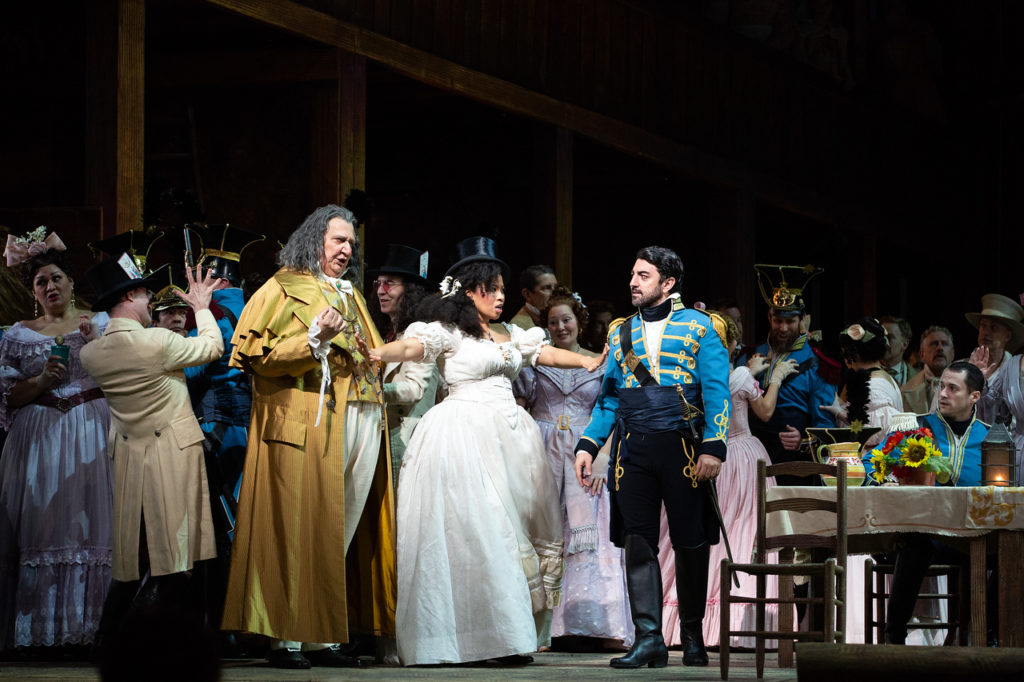
Marty Sohl/Met Opera
Comic Forces
In the role of Dulcamara Ambrogio Maestri reprised his acclaimed turn. The baritone exudes an imposing presence on stage as he has a booming baritone that easily floats into the Met stage. But what makes his work all the more impressive is that while he is not a physical actor, the small gestures, whether with his magician’s hands in the duet with Adina and with the villagers, created a comic timing that brought much-needed energy to the production. Then there was the pasta eating in the second act. You could see how Maestri embraced the food he had in his hands and how just relished every bite. And then there were the vocal gestures like his whistles in the barcarolle and his emphasis on certain words in his patter.
Vocally, he was also impressive if sometimes imprecise. Most of Dulcamara’s writing is fast patter and staccato writing with a couple of held notes. In “Udite udite oh! rustici,” Maestri’s diction was spot on and you could hear every vowel and consonant. There were some moments, especially in the “L’ho portato per la posta” recap where he got off and lost some of his breath. But he quickly recovered and continued his scheming in this aria. The second part “Così chiaro è come il sole” saw Maestri relishing the more legato line, bringing out his potent sound.
His subsequent duets with Camarena were delightful as he sang with the same clarity. The duet was quite comical as he picked out a random bottle for Nemorino and worked with his assistants to try and avoid any more conversation. And then there was his duet with Adina, which saw Maestri at his most physical, following Schultz’s Adina around and trying to outsmart her.
In the role of Belcore, Davide Luciano brought swagger. From his first entrance, he had a dominant presence trying as he attempted to impress Schultz’s Adina. He confidently strutted across the stage making seductive faces and handing her flowers. When that didn’t work he had a playful sword fight with Schultz. And then as he played a game of tag with Camarena’s Nemorino, you could see Luciano just enjoying the comedy of the circumstance.
The aforementioned bullying that Sher imposes on the character was the least believable of Luciano’s performance as his Belcore was too much of a brash and comic figure throughout the first 45 minutes. Moreover, that brutality is never seen again because during the duet “Ai perigli della guerra,” he had an exaggerated overconfident persona that just played into the goofiness and comedy of the character.
Vocally Luciano has a brassy baritone that he uses with agility. During his entrance aria “Come Paride vezzoso,” he dispatched with ease, displaying accurate coloratura and an elegant baritone voice. During his duet with Nemorino, “Qua la mano, giovinotto,” he sang with a forte sound that emphasized the overconfidence of his character and then dispatched virtuosic coloratura on “Ho ingaggiato il mio rivale: Anche questa è da contar.” It was a great counter to Camarena’s more legato and ardent phrasing.
In the role of Gianetta, Brittany Renee was impressive, showing a lush lyric soprano that especially shone during her solo “Saria possible.” She sang this passage with staccato phrases, a quiet piano sond, and some gorgeous legato phrases. Her comic timing was sensational as she interacted with the women’s chorus. As she attempted to crescendo, she quietly diminuendoed, also shushing the women’s chorus. In the ensemble work, her voice also shone, especially in “Io già m’immagino che cosa brami” where her patter work resonated through all the voices. Her interactions with Schultz were also crucial in helping audiences understand who this character was and why she was always around.
In the pit, Michele Gamba made his Met debut and moved the proceeding along with a light orchestra that sometimes could have used a little more strength, particularly in the cavernous Met auditorium. The music sometimes felt lost in the space and didn’t seem to carry well. That said, he was incredible in making the tempi drive forward, especially in the ensemble strettas where he chose faster tempi. There was never a moment that dragged the entire evening and it was clear that he was very attentive to the singer’s needs.
Overall this was a fine “Elisir” that is in desperate need of a new stage director and / or production.
Categories
Reviews
